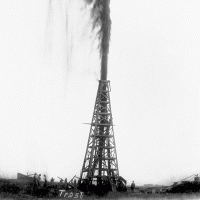Giant Under the Hill: A History of the Spindletop Oil Discovery at Beaumont, Texas, in 1901. By Judith Walker Linsley, Ellen Walker Rienstra, and Jo Ann Stiles. (Austin: Texas State Historical Association, 2002. Pp. xii + 304. Acknowledgements, preface, prologue, selected bibliography, notes, index. $22.95 cloth.)
Few people remember that Texas and oil have not always been joined together in the public consciousness. The authors, residents of southeast Texas, provide a survey of the people, events, and science that came together at the genesis of the Texas-Oil connection, with a specific focus upon their native region. Most geologists, at the turn of the past century, did not believe that southeast Texas possessed oil, but a few dedicated individuals spent their lives and fortunes to prove otherwise. Their efforts were rewarded with the Spindletop oil gusher that brought new wealth to the region and reshaped Texas culture, identity, and politics, though the well itself played out within a short time, never becoming a moneymaker, losing the majority of its oil before the drillers developed an effective system of capping wells.
Modern-day Texans are not aware of the work of Pattillo Higgins, Anthony Lucas, or the Hamill brothers, but the book demonstrates how these men ushered in a new era, not only for Texas but the world, when their dreams of oil came to fruition. In the wake of their discovery, oil became the world’s predominant energy source, and Texas became the primary producer of the commodity for the greater part of the twentieth century. Great multinational corporations, such as Texaco, were formed to capitalize on oil’s potential. Yet the book’s strength is not found in discussing the broad strokes of oil’s rise in prominence, but rather in looking at the personal lives of the men who brought it about.
 The authors’ chronological approach allows the reader to follow the events easily, and the occasional background information provides for a full development of each character. From Higgins’ wayward youth and subsequent religious conversion to Lucas’ desertion from the Austrian military, each of the major participants comes alive in the narrative. Their tenacity and unwavering dedication to find oil was rewarded, not only changing Texas, but providing a compelling story. Higgins serves as the focal point, due to his determination to find oil, though his former partners removed him from participation in the actual drilling and success of Spindletop. The authors also possess admiration for the problem-solving skills of these men. The Hamill brothers’ ingenuity in overcoming logistical problems not only led to the successful discovery of oil in this well, but served as the impetus for oilfield work for generations, as their solutions continued to be implemented.
The authors’ chronological approach allows the reader to follow the events easily, and the occasional background information provides for a full development of each character. From Higgins’ wayward youth and subsequent religious conversion to Lucas’ desertion from the Austrian military, each of the major participants comes alive in the narrative. Their tenacity and unwavering dedication to find oil was rewarded, not only changing Texas, but providing a compelling story. Higgins serves as the focal point, due to his determination to find oil, though his former partners removed him from participation in the actual drilling and success of Spindletop. The authors also possess admiration for the problem-solving skills of these men. The Hamill brothers’ ingenuity in overcoming logistical problems not only led to the successful discovery of oil in this well, but served as the impetus for oilfield work for generations, as their solutions continued to be implemented.
While a few major characters take center stage, the authors also provide insight into peripheral participants, including women, minorities, and the relationships between the various groups. Speculators, investors, and common laborers provide the details of the story, as each came to find wealth, glory, or both. While the book does not claim to be a revisionist look at these events, the diversity of those who participated in Spindletop, and the thousands of wells that shortly followed it, shine forth.
The book provides an important analysis of the oil strike’s impact on the local Beaumont community as it transformed from a lumber-producing region, rather than a comprehensive evaluation of the oil industry. It is meticulously researched, and the inclusion of numerous photographs and images shows how the landscape and populace of the region evolved after the discovery. The authors relate the protagonists’ research and scientific arguments used to justify drilling, painting an effective picture of the community before oil’s discovery. As the narrative moves through the drilling phase and into the oil boom, the sleepy town changed into a lively, energetic place. Though other regions soon eclipsed Beaumont’s oil production, it became a major hub for refineries.
The impact that the discovery had upon the world’s economy is undeniable, though the authors never stray far from their primary intent to demonstrate the effect upon the Beaumont region. Though it focuses upon one community, it is placed into the larger context of oil exploration. It would be easy to lose sight of humanity in a study of the rise of oil, but the book maintains a decidedly human character. The book will be of interest to historians interested in the region, but most readers will be able to identify with these pioneers and appreciate their efforts.
Texas and oil are intimately linked in the modern world, and this book shows how that relationship began, due to the work of Higgins, Lucas, the Hamills, and others. In a short period of time, Beaumont changed its major commodity from lumber to oil, and Texas changed with it, becoming the world’s largest oil producer. The allure of petroleum changed the landscape, literally and figuratively. The Spindletop gusher did not directly produce wealth, but it transformed the world.






